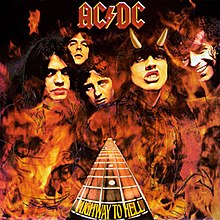Shot Down in Flames
| Highway to Hell | ||||
|---|---|---|---|---|
 |
||||
| Studio album by AC/DC | ||||
| Released | 27 July 1979 | |||
| Recorded | December 1978 at Albert Studios in Sydney, Australia, January–February 1979 at Criteria Studios in Miami, Florida, March–April 1979 at Roundhouse Studios in London, England | |||
| Genre | ||||
| Label | Albert, Atlantic | |||
| Producer | Robert John "Mutt" Lange | |||
| AC/DC chronology | ||||
|
||||
| Alternative cover art | ||||

Artwork for early, pre-remastered Australian releases
|
||||
| Singles from Highway to Hell | ||||
|
||||
| Professional ratings | |
|---|---|
| Review scores | |
| Source | Rating |
| AllMusic | |
| Blender | |
| Rolling Stone | |
Highway to Hell is the sixth studio album by Australian hard rock band AC/DC, released on 27 July 1979. It was the band's fifth internationally released studio album and the sixth to be released in Australia. It was the last album featuring lead singer Bon Scott, who died early the following year on Tuesday 19 February 1980.
By 1978, AC/DC had released five albums internationally and had toured Australia and Europe extensively. In 1977, they landed in America and, with virtually no radio support, began to amass a live following. The band's most recent album, the live If You Want Blood, had reached #13 in Britain, and the two albums previous to that, 1977's Let There Be Rock and 1978's Powerage, had seen the band find their raging, rhythm and blues-based hard rock sound. Although the American branch of Atlantic Records had rejected the group's 1976 LP Dirty Deeds Done Dirt Cheap, it now believed the band was poised to strike it big in the States if only they would work with a producer who could give them a radio-friendly sound. Since their 1975 Australian debut High Voltage, all of AC/DC's albums had been produced by George Young and Harry Vanda. According to the book AC/DC: Maximum Rock & Roll, the band was not enthusiastic about the idea, especially guitarists Angus Young and Malcolm Young, who felt a strong sense of loyalty to their older brother George:
The producer Atlantic paired the band up with was South African-born Eddie Kramer, best known for his pioneering work as engineer for Jimi Hendrix but also for mega-bands Led Zeppelin and Kiss. Kramer met the band at Criteria Studios in Miami, Florida but, by all accounts, they did not get on. Geoff Barton quotes Malcolm Young in Guitar Legends magazine: "Kramer was a bit of a prat. He looked at Bon and said to us, 'Can your guy sing?' He might've sat behind the knobs for Hendrix, but he's certainly not Hendrix, I can tell you that much." Former AC/DC manager Michael Browning recalls in the 1994 book Highway to Hell: The Life and Times of AC/DC Legend Bon Scott, "I got a phone call from Malcolm in Florida, to say, 'This guy's hopeless, do something, he's trying to talk us into recording that Spencer Davis song,' 'Gimme Some Loving,' 'I'm a Man,' whatever it was..." Browning turned to Zambian-born producer Robert John "Mutt" Lange to step in. Lange was best known for producing the Boomtown Rats #1 hit "Rat Trap" and post-pub rock bands like Clover, City Boy, and Graham Parker. In 1979 singer Bon Scott told RAM magazine, "Three weeks in Miami and we hadn't written a thing with Kramer. So one day we told him we were going to have a day off and not to bother coming in. This was Saturday, and we snuck into the studio and on that one day we put down six songs, sent the tape to Lange and said, 'Will you work with us?'" The band had also signed up with new management, firing Michael Browning and hiring Peter Mensch, an aggressive American who had helped develop the careers of Aerosmith and Ted Nugent.
...
Wikipedia
